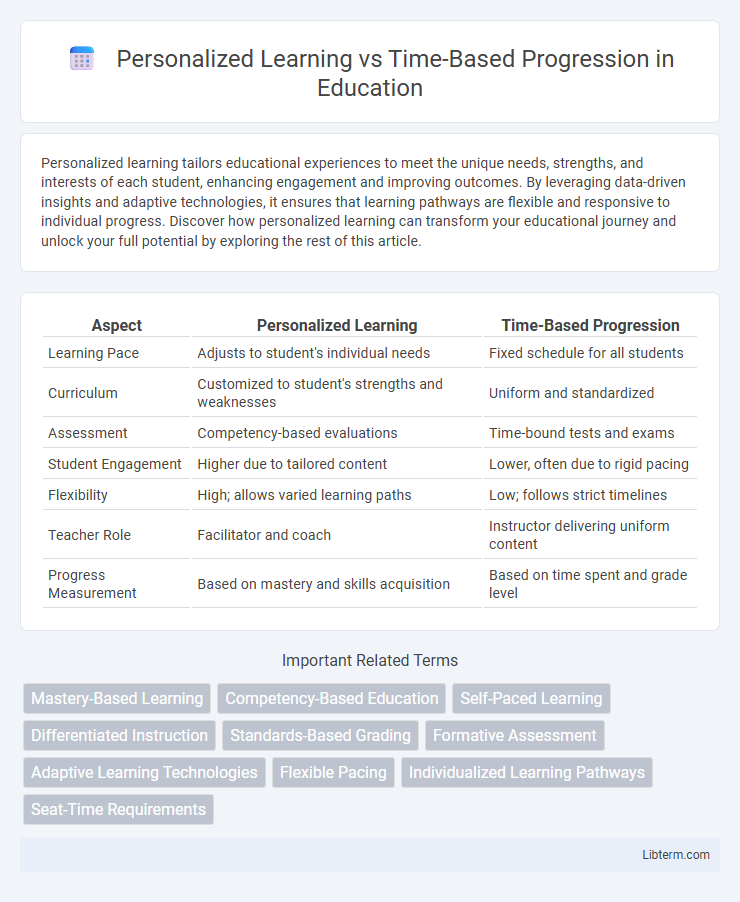Personalized learning tailors educational experiences to meet the unique needs, strengths, and interests of each student, enhancing engagement and improving outcomes. By leveraging data-driven insights and adaptive technologies, it ensures that learning pathways are flexible and responsive to individual progress. Discover how personalized learning can transform your educational journey and unlock your full potential by exploring the rest of this article.
Table of Comparison
| Aspect | Personalized Learning | Time-Based Progression |
|---|---|---|
| Learning Pace | Adjusts to student's individual needs | Fixed schedule for all students |
| Curriculum | Customized to student's strengths and weaknesses | Uniform and standardized |
| Assessment | Competency-based evaluations | Time-bound tests and exams |
| Student Engagement | Higher due to tailored content | Lower, often due to rigid pacing |
| Flexibility | High; allows varied learning paths | Low; follows strict timelines |
| Teacher Role | Facilitator and coach | Instructor delivering uniform content |
| Progress Measurement | Based on mastery and skills acquisition | Based on time spent and grade level |
Introduction to Personalized Learning and Time-Based Progression
Personalized learning tailors educational experiences to individual student needs, preferences, and pace, promoting mastery and engagement through adaptive technologies and individualized instruction. Time-based progression relies on fixed schedules and age-grade benchmarks, advancing students based on time spent rather than demonstrated competency. This contrast highlights how personalized learning prioritizes student growth and mastery over uniform time constraints.
Core Principles of Personalized Learning
Personalized learning centers on tailoring education to individual students' strengths, needs, and interests, promoting mastery at each learner's pace rather than adhering to uniform time frames. Core principles include adaptive instruction, competency-based progression, and learner autonomy, which foster deeper engagement and improved retention. This approach contrasts with time-based progression by emphasizing knowledge mastery over seat time, enabling customized educational experiences that accommodate diverse learning styles.
Fundamentals of Time-Based Progression
Time-Based Progression structures education around fixed schedules and standardized pacing, where students advance after a set time regardless of mastery. This model emphasizes uniformity and administrative ease but often overlooks individual learning speeds and styles. The rigidity can hinder mastery, leading to gaps in knowledge and reduced engagement.
Flexibility in Learning Paces
Personalized learning offers unparalleled flexibility in learning paces by tailoring educational experiences to individual student needs, allowing learners to advance upon mastery rather than fixed schedules. Time-based progression confines students to predetermined time frames, often leading to gaps in understanding or disengagement. Adaptive learning technologies and competency-based assessments empower personalized learning environments, fostering improved retention and student motivation.
Assessment Methods: Mastery vs. Timeframes
Assessment methods in personalized learning emphasize mastery by allowing students to progress upon demonstrating understanding of concepts, ensuring deeper knowledge retention and skill development. In contrast, time-based progression relies on fixed schedules and grade levels, assessing students primarily through timed exams and standardized benchmarks that may not reflect individual readiness. Mastery-based assessments promote adaptive learning paths and formative feedback, aligning evaluation with student performance rather than arbitrary time constraints.
Student Engagement and Motivation
Personalized learning enhances student engagement by tailoring content and pacing to individual interests and abilities, fostering intrinsic motivation and deeper understanding. Time-based progression often leads to disengagement due to rigid schedules that ignore varying learning speeds, causing frustration or boredom. Research shows students in personalized environments demonstrate higher motivation levels and improved academic outcomes compared to traditional, time-locked classrooms.
Technology’s Role in Personalization
Technology enables personalized learning by adapting educational content to individual student needs through data-driven algorithms and AI-powered platforms, improving engagement and outcomes. Learning management systems and adaptive software track progress in real-time, allowing tailored pacing beyond traditional time-based progression models. Digital tools facilitate customized feedback and resources, fostering mastery learning and accommodating diverse learning styles efficiently.
Challenges and Limitations of Each Approach
Personalized learning faces challenges in scalability and requires sophisticated data analytics to tailor content effectively for diverse learners, which can strain institutional resources. Time-based progression limits flexibility, often forcing students to move forward regardless of mastery, leading to gaps in knowledge and disengagement. Both approaches struggle with balancing individualized needs and standardized assessment, complicating educational outcomes measurement.
Impact on Educational Equity
Personalized learning tailors instruction to individual student needs, promoting equitable access to knowledge and skill mastery regardless of pace, which reduces achievement gaps among diverse learners. Time-based progression enforces uniform advancement regardless of comprehension, often disadvantaging students who require more time or alternate learning strategies, thereby exacerbating educational inequities. By allowing flexible timelines and adaptive learning paths, personalized learning enhances educational equity through responsiveness to varied strengths and challenges.
Future Trends in Learning Progression
Personalized learning leverages AI algorithms to adapt educational content to individual student needs, enhancing engagement and mastery at a customizable pace. Time-based progression remains prevalent but is increasingly supplemented by data-driven insights that promote competency-based advancement rather than fixed schedules. Emerging trends point to hybrid models integrating real-time analytics, adaptive assessments, and micro-credentialing to revolutionize how learners progress and demonstrate skills in diverse educational settings.
Personalized Learning Infographic

 libterm.com
libterm.com